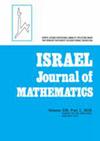全域的有效希尔伯特不可还原性定理
IF 0.8
2区 数学
Q2 MATHEMATICS
引用次数: 0
摘要
更准确地说,我们给出了不保留给定不可还原多项式 F(T, Y)∈ K[T, Y] 的不可还原性或伽罗瓦群的特殊化 \(t \in {{\cal O}_K}\) 的有效边界。这些边界在多项式 F(T, Y) 的高和度上是明确的,在参数 \(t \in {{\cal O}_K}\) 的大小上是最优的。我们的证明以统一的方式处理了函数场和数场的情况。本文章由计算机程序翻译,如有差异,请以英文原文为准。
Effective Hilbert’s irreducibility theorem for global fields
We prove an effective form of Hilbert’s irreducibility theorem for polynomials over a global field K. More precisely, we give effective bounds for the number of specializations \(t \in {{\cal O}_K}\) that do not preserve the irreducibility or the Galois group of a given irreducible polynomial F(T, Y) ∈ K[T, Y]. The bounds are explicit in the height and degree of the polynomial F(T, Y), and are optimal in terms of the size of the parameter \(t \in {{\cal O}_K}\). Our proofs deal with the function field and number field cases in a unified way.
求助全文
通过发布文献求助,成功后即可免费获取论文全文。
去求助
来源期刊
CiteScore
1.70
自引率
10.00%
发文量
90
审稿时长
6 months
期刊介绍:
The Israel Journal of Mathematics is an international journal publishing high-quality original research papers in a wide spectrum of pure and applied mathematics. The prestigious interdisciplinary editorial board reflects the diversity of subjects covered in this journal, including set theory, model theory, algebra, group theory, number theory, analysis, functional analysis, ergodic theory, algebraic topology, geometry, combinatorics, theoretical computer science, mathematical physics, and applied mathematics.

 求助内容:
求助内容: 应助结果提醒方式:
应助结果提醒方式:


